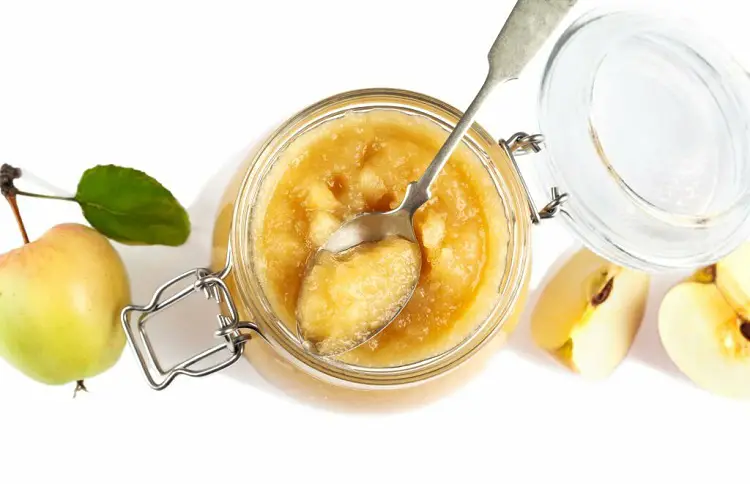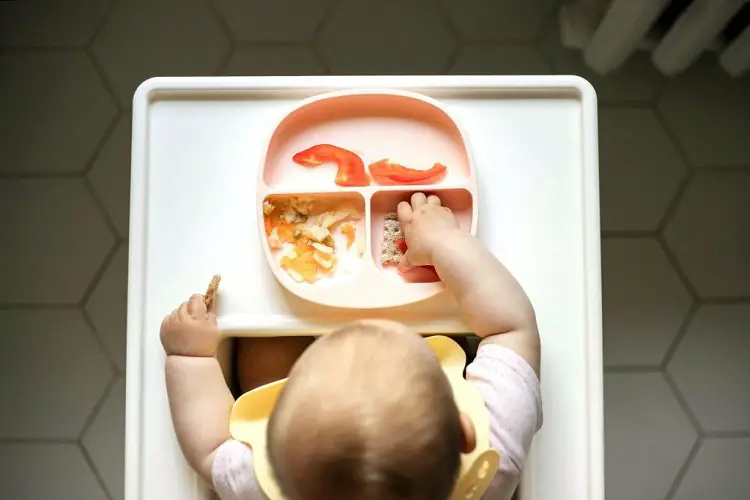When introducing solid foods to your baby, especially when transitioning, it’s important to start with simple, easily digestible options.
If you have been wondering what foods are suitable, we will explore some common baby foods to start with in this article, to help narrow your search.
Baby Foods To Start With
1. Single-grain Cereals
When it comes to introducing solid foods to babies, rice cereal and rolled oats mixed with breast milk or formula are excellent options to start with.
These foods are often favored for the baby’s first meals because they are easily digestible and have a mild flavor.
Rice cereal is fortified with iron and other essential nutrients that are important for a baby’s growth and development. Rolled oats, on the other hand, are a great source of fiber, vitamins, and minerals.
2. Pureed Vegetables
When it comes to introducing solid foods to your baby, cooked and pureed vegetables are a great option for baby foods to start with.
Vegetables such as sweet potatoes, carrots, peas, and squash are nutritious and easy to digest.
It is recommended to start with one vegetable at a time and gradually introduce new ones so that you can monitor your baby for any allergies or sensitivities.
This will also help you pinpoint which vegetable may be causing any adverse reactions. Remember to introduce new foods slowly and wait a few days before introducing another new food.
3. Pureed Fruits

Apples, pears, bananas, and avocados are all excellent choices that are easy to digest and usually well-received by babies.
These fruits are rich in nutrients and provide a variety of flavors and textures for your little one to explore.
When preparing the puree, be sure to remove any seeds or tough skins and use a food processor or blender to create a smooth consistency that is safe for your baby to eat.
4. Mashed Banana
Bananas are an excellent choice as a first food for babies. They are soft and easy for tiny fingers to hold, which makes them perfect for babies who are learning to self-feed.
Not only are they easy to eat, but they are also packed with nutrients such as potassium, vitamin C, and vitamin B6, which are essential for your baby’s growth and development.
Bananas are naturally sweet, which makes them a great option for babies who are just starting to explore new flavors. The aroma of bananas is also very appealing to babies, which can help encourage them to eat.
5. Puree Butter
Avocados are a fantastic source of monounsaturated and polyunsaturated fats, which are essential for a healthy diet.
They also contain fiber, vitamins, and minerals that can help improve digestion and boost overall health.
With their creamy texture and mild flavor, avocados can be easily mashed into a smooth and delicious spread that can be used in a variety of dishes, from sandwiches to dips and dressings.
Whether you’re looking to add some extra nutrients to your child’s diet or simply love the taste of avocados, they are a great choice for a healthy and tasty addition to any meal.
6. Minced Meat
As your baby grows and develops, introducing protein into their diet becomes important. Pureed meats such as chicken, turkey, or beef are great options to start with.
It is important to ensure that the meat is thoroughly cooked and pureed to avoid any choking hazards.
You can also introduce a variety of other protein sources such as fish, lentils, and beans to provide a well-rounded diet for your little one.
7. Natural Yoghurt
Full-fat plain yogurt is an excellent dairy product that is rich in calcium and probiotics.
The high levels of calcium in plain yogurt can help to strengthen your baby’s bones, while probiotics help to keep your gut healthy.
It is essential to avoid flavored yogurts with added sugar, especially if you are just starting to incorporate yogurt into your diet.
8. Baby Rice Cakes or Teething Biscuits
These can be introduced as a snack when your baby is ready to eat finger foods. Make sure they’re appropriate for your baby’s age and development.
9. Cooked And Mashed Beans
Lentils, chickpeas, and other beans can be cooked until tender and mashed. These foods are also a great source of protein and iron, and they help to support your baby’s growth and development.
10. Cooked Soft Pasta
Overcooked pasta can be cut into small pieces or mashed for babies who are ready to eat more textured foods.
It’s important to note that introducing solid foods to a baby should be done gradually and under the guidance of a healthcare professional to ensure that the baby is getting the proper nutrition they need.
When To Start Baby Food

The timing of introducing solid foods to your baby varies from baby to baby, but most babies are ready to start solid foods around 6 months of age.
Here are some signs that may indicate your baby is ready to eat solid foods:
Sitting Up
As your baby grows, they will develop the ability to sit up with good support and control their head movements.
This is an important milestone in their development as it prepares them for safe and effective feeding. When they can sit up with support, they will be able to swallow food more easily and reduce the risk of choking.
Interest in Food
When your baby starts to display curiosity about the food you’re eating and reaches out for it or opens their mouth when you offer them a spoonful, these are signs that they may be ready to start solid foods.
However, it’s important to keep in mind that every baby is different, and there are other developmental cues to consider before introducing solids.
It’s recommended to consult with your pediatrician to determine if your baby is ready and to get guidance on the best way to introduce solid foods.
Loss Of Tongue Thrust Reflex
In the early stages of life, babies are born with an innate reflex that causes them to push food out of their mouths.
This reflex is a natural defense mechanism that helps prevent choking and ensures that babies only consume the required amount of milk.
However, as babies grow and develop, this reflex begins to fade, usually around 4-6 months of age.
As a result, swallowing becomes easier, and babies can start to explore a wide range of new foods and textures.
Increased Hunger
If your baby seems hungrier than usual, even after exclusively breastfeeding or formula feeding, this could indicate he beads more nutritious food.
Chewing Ability
Your baby should be able to put food back in his mouth and chew, even if he doesn’t have teeth yet. They can use their thumb and index finger, a sign of dexterity required to feed themselves.
Double Their Birth Weight
Most newborns double their weight between 4 and 6 months, which can be a general guideline for preparation.
It’s important to note that although these are general signs of readiness, each baby is unique. Some babies may be ready a little earlier or later than others.
Additionally, it is essential to consult your pediatrician or healthcare professional before feeding your baby solid foods.
They can give you personalized advice based on your child’s development and any specific concerns.
When introducing solid foods to your baby, start with simple, one-ingredient foods and gradually introduce a variety of textures and flavors.
Breast milk or formula remains the main source of nutrition during the first year of life, and solid foods should supplement a baby’s milk diet rather than replace it.
Solid Foods Chart For Babies
A solid food chart can serve as a guide for the right type of foods to give your child at every stage starting from when they begin taking solids.
Additionally, it will make it easier to plan their meal times.
| Age | Foods |
| 4-6 Months | Apples, Avocados, Bananas, Oatmeal, Green peas, Pears, Sweet potato, Butternut squash |
| 6-8 Months | Carrots, Apricots, Mango, Nectarines, Parsnips, Peaches, Peas, Yoghurt, Plums, Prunes, Pumpkin, Zucchini, Chicken, Tofu |
| 8-10 Months | Asparagus, Beets, Blueberries, Broccoli, Cauliflower, Coconut, Cherries, Eggplant, Figs, Pork, Eggs |
| 10-12 Months | Spinach, Corn, Tomatoes, Strawberries, Cow’s milk, Citrus |
Related Posts:
- Baby Foods With Heavy Metals
- Baby Food Brands To Avoid
- Healthy & Easy Foods For Extremely Picky Eaters
- How To Make Avocado and Banana Puree for Baby
How To Start Baby On Solids
Starting solids is an exciting stage, but it’s essential to do it gradually and safely.
Here is a step-by-step guide to help you feed your baby well:
Consult Your Paediatrician
Before starting solid foods, schedule an exam with your baby’s pediatrician. They can assess your child’s readiness and provide personalized advice based on their specific needs and concerns.
Choose The Right Time
Wait until your baby is about 6 months old or shows signs of readiness (as mentioned in the previous tip). Starting too early can increase the risk of allergies and digestive problems.
Gather Supplies
You’ll need some basic items, including baby food, a small spoon, a bib, a high chair, and a soft-topped cup of water.
Choose Suitable Foods
Start with simple, single-ingredient, easily digestible foods. Common first foods include rice cereal, oatmeal, mashed vegetables ( e.g. sweet potatoes, carrots, peas), and mashed fruits like apples, pears, and bananas.
Food Preparation
If you prepare your baby food, make sure it is thoroughly cooked and pureed until smooth. If you use store-bought baby food, choose products without added sugar or salt.
Feeding Schedule
Start with one feeding per day, ideally when your baby is alert and not too tired or fussy. Mornings can be a good time to start because your baby is usually more relaxed.
Feeding Technique
Use a small spoon to scoop out small amounts of food. Let your baby taste and get used to the new feeling. Be patient and allow children to explore food at their own pace.
Gradually Increase Diversity
After a few days to a week, introduce another single-ingredient food. Continue this process by gradually increasing the variety of foods and textures.
Pay Attention To Allergies
Be alert for any signs of allergies or food sensitivities, such as rash, vomiting, diarrhea, or unusual restlessness. If you suspect an allergy, stop feeding your child the particular food and consult your pediatrician.
Breastfeeding Or Formula Feeding First
Continue to feed your baby breast milk or formula before introducing solid foods. This ensures your baby gets key nutrients and quenches his hunger before trying new foods.
Offer Water
You can start giving your baby small amounts of water in a soft-lidded cup during mealtimes to help him stay hydrated.
Be Patient and Responsive
Let your baby guide this process. Some babies get used to solid foods right away while others may need time to adjust. Don’t force or rush the process.
Practice Good Hygiene
Wash your hands before feeding your baby and keep utensils and surfaces clean.
Conclusion
Introducing solids is a gradual process, and the primary source of nutrition for your baby should still be breast milk or formula during their first year.
As your baby grows and becomes more comfortable with solids, you can explore more baby foods to start with and gradually increase the frequency.
